Abstract: The "2024 Lithium Battery Anode Market and Frontier Technology Summit Forum; The 6th International Natural Graphite and Application Market Summit Forum " was hosted by ICCSINO, with Shanghai Shanshan Technology Co., Ltd. as the general sponsor, and co-organized by Sichuan Jinhuineng New Materials Co., Ltd. and Maoming Hongxin Fine Chemical Co., Ltd. The conference was held in Yangzhou, Jiangsu from March 27th to 28th. It focused on the market prospects, technical routes, supply and demand conditions, new developments and other focus topics of lithium battery anode materials, gathering domestic and foreign experts Scholars, business representatives, upstream and downstream stakeholders, and third-party service providers conducted in-depth exchanges and discussions. It aimed to promote the innovation, integration and development of the lithium battery anode material industry chain, and promote the transformation and upgrading of China's anode industry in the direction of high-end, intelligent and green.
As the global energy revolution continues to advance, the market demand for lithium batteries, a key technology supporting green applications such as electric vehicles and renewable energy storage, is growing rapidly. Data shows that global lithium battery production is expected to reach 1,530GWh in 2024, a yearly increase of approximately 25%. As an important component of lithium battery anode materials, its demand growth rate will also remain at around 20%.
In the field of anode materials, although traditional graphite anodes still dominate, they face challenges such as overcapacity and declining profits. At the same time, new anode materials such as silicon-based anodes, metal oxide/ sulfide anodes, hard carbon anodes, etc. have gradually attracted widespread attention. These new anodes have the potential to improve battery energy density, cycle life and safety, and are expected to have a certain impact on existing anode material systems.
On the other hand, factors such as the "de-risking" wave in the United States, price fluctuations of anode raw materials, and increasingly strict environmental policies will bring new challenges to China's anode material industry. How to seek high-quality development of the anode material industry under the new background is a major issue facing enterprises and research institutions.
To this end, the "2024 Lithium Battery Anode Material Market and Frontier Technology Summit Forum;The 6th International Natural Graphite and Application Market Summit Forum" hosted by ICCSINO, with Shanghai Shanshan Technology Co., Ltd. as the general sponsor, and co-organized by Sichuan Jinhuineng New Materials Co., Ltd. and Maoming Hongxin Fine Chemical Co., Ltd. The conference was held in Yangzhou, Jiangsu from March 27th to 28th. Focusing on the market prospects, technical routes, supply and demand status, new developments and other focus topics of lithium battery anode materials, domestic and foreign experts gathered Scholars, business representatives, upstream and downstream stakeholders, and third-party service providers conducted in-depth exchanges and discussions. It aims to promote the innovation, integration and development of the lithium battery anode material industry chain, and promote the transformation and upgrading of China's anode industry in the direction of high-end, intelligent and green.
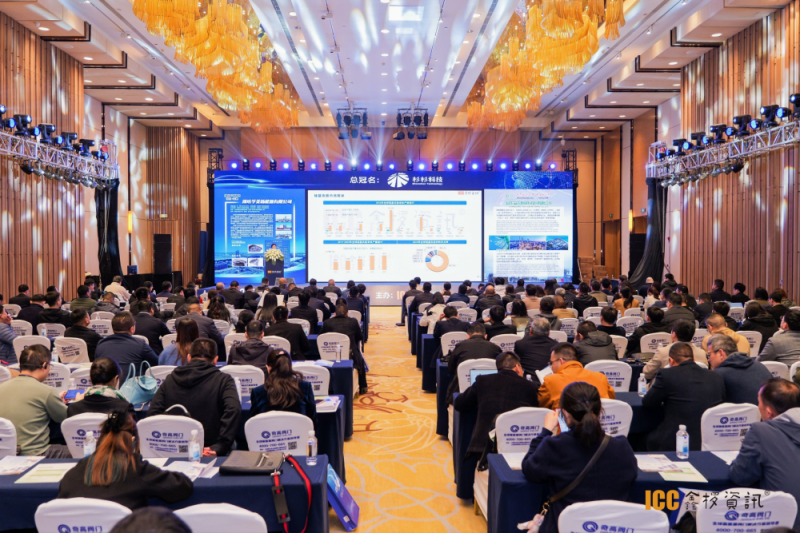
On the afternoon of the 27th, at the "Special Session for Sharing New Markets and New Technology Achievements", the guests shared their cutting-edge views and technological progress. Lian Ping, general manager of ICC, delivered a speech entitled "Silicon-based anode material market status and trends". She pointed out that global anode material output will reach 1.76 million tons in 2023, a year-on-year increase of 24.5%, and the market concentration is high. High-nickel cathode materials are accelerating. Next-generation battery materials include ultra-high nickel cathodes and silicon-based anodes, which will effectively increase battery energy density.
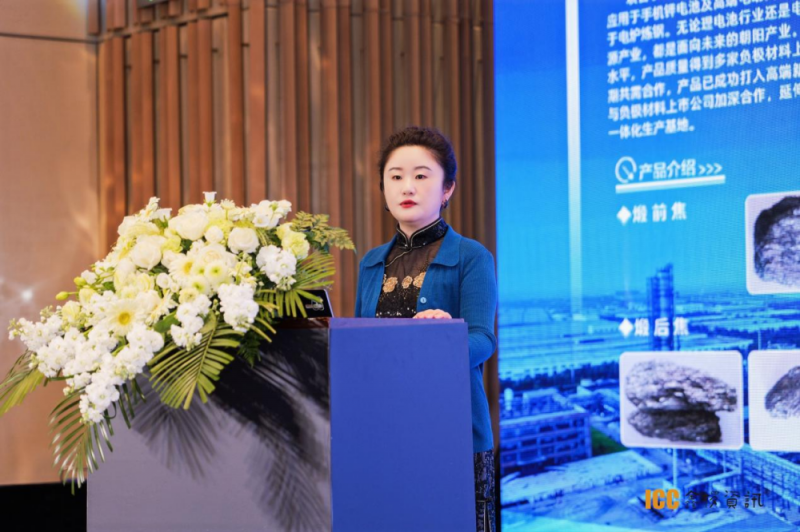
Lian Ping introduced in detail the advantages and disadvantages of the two mainstream technical routes for silicon-based anodes - silicon-carbon anodes and silicon-oxygen anodes. She said that the theoretical capacity of the silicon-carbon anode is as high as 4200mAh/g, and the first-time Coulombic efficiency is high, but large-scale production still faces many challenges; the reversible capacity of the silicon-oxygen anode is close to the theoretical capacity and the rate performance is good, but the first-time efficiency is low and the production cost is high. Common challenges faced by silicon-based anodes include high volume expansion, poor conductivity, and short cycle life. The material structure and process need to be optimized through carbon coating, lithium supplementation, etc.
Lian Ping finally analyzed the broad market prospects of silicon-based anodes. She pointed out that with the mass production and promotion of cutting-edge technologies such as condensed matter batteries , Kirin batteries, and large cylindrical batteries in CATL, as well as the development of solid-state batteries, the demand for silicon-based anodes will further expand. At present, the global silicon-based anode production capacity is only 27,000 tons, and the planned production capacity is 470,000 tons. There is huge room for development.
Then, the representative of Anhui Huike New Energy Co., Ltd. gave a speech on "New high-temperature carbonization technology helps fast-charging anode". According to the company, they have built a high-temperature carbonization production line in a tunnel kiln with a length of 168 meters and a maximum temperature of 1350°C. It has the advantages of wide production range, large production capacity, good quality, and environmental protection.
According to a representative from Anhui Huike, the carbonization tunnel kiln can perform high-temperature carbonization of solid-phase and liquid-phase coated artificial graphite, natural graphite, hard carbon and other anode materials. One production line can carbonize 55-65 tons of anode materials every day, with an annual production capacity of 18,000-22,000 tons. The tunnel kiln is divided into three sections: preheating, constant temperature and cooling. The carbonization curve is balanced to ensure product consistency. Taking natural graphite as an example, compared with roller kiln , its tap density is 0.05-0.12 higher, which helps to improve the fast charging performance of anode. He said that the tunnel kiln uses natural gas to burn and heat up, and directly burns the volatile matter generated during the carbonization process, which not only avoids environmental protection problems, but also reduces energy consumption. The company's strategic location allows it to provide carbonization services during the transportation of anode materials, reducing freight costs. In the future, a testing center and finished product line will be built to improve the industrial chain and better serve the anode industry. Then, Lang Ping, general manager of Heilongjiang Wolong Graphene Technology Co., Ltd., gave a speech on the "Graphene Enhanced Lithium-ion Battery Pole Project". Lang Ping compared the differences between wet and dry electrodes and liquid and solid electrolytes, and explained various solutions of Wolong Technology, including using polytetrachlorethylene and a series of exclusive technologies to make the electrode structure into a mesh-like fiber structure to achieve the effect that lithium batteries do not catch fire and can continuously supply power; by not using solvents to avoid evaporation problems, and using exclusive processes to extrude electrodes, existing lithium batteries can be used without changing the type of NCM materials and In the case of proportion, the energy density can reach over 365Wh/Kg.
Lang Ping also highlighted the advantages of Wolong's solid electrolytes compared to polymer solid electrolytes, oxide solid electrolytes and sulfide solid electrolytes. She also revealed that Wolong Technology has overcome the technical "triangle" that is considered insurmountable by the industry - the problems of performance, safety and mass production cost. It is understood that Wolong's products do not catch fire or explode when in a perforated state, and can still provide continuous power supply; the cost of mass production is controllable, and there is no need to spend 42 times the electricity to evaporate the solvent; Wolong's batteries are also easier to recycle and consume less energy. Characteristics such as electricity are more in line with carbon neutrality policies and sustainable development goals. Finally, Lang Ping also briefly described the company's value proposition and business model. She believes that Wolong Technology is a supplier to existing battery manufacturers, not a competitor. Kunal Daga, founder of MolSynth India, elaborates on "Battery Materials - Opportunities in India". Kunal first introduced the development prospects of India's new energy market. According to predictions, India's lithium battery demand will reach more than 400 GWh by 2030. The government has provided incentive support to many companies, including Rajesh Exports and Ola Electric, to encourage the development of the battery materials industry.
Kunal pointed out that India has advantages such as low utility costs, abundant human resources, and favorable government policies, which can provide affordability for investment in battery material production. At the same time, India also faces challenges such as the security of raw material supply, which needs to be addressed through diversified procurement methods. He encouraged Chinese companies to enter the Indian market through joint ventures and cooperation, establish local production lines, and use local advantages to improve competitiveness. Kunal also introduced MolSynth's investment plan for a fine chemical plant in Pune, India, hoping to integrate supply chain integration by integrating Japanese technology and infrastructure advantages, and provide partners with integrated services such as customized contract manufacturing and ingredient distribution. Subsequently, Deng Dan, Director of Energy and Sustainable Operations of Bureau Veritas, gave a keynote speech on "The Road to Sustainable Corporate Development", focusing on the green trade barriers brought to the lithium battery industry by the EU Carbon Border Adjustment Mechanism (CBAM) and the Battery Act. and countermeasures. Deng Dan first pointed out that in the face of the increasingly severe climate change situation, the EU has introduced a series of carbon neutral regulations and policies, creating green trade barriers for high-emission industries including lithium batteries. According to the requirements of CBAM and the Battery Act, indicators such as the full life cycle carbon footprint and raw material recycling rate of lithium batteries will be strictly regulated. This requires lithium battery companies to conduct inspections on the entire supply chain from upstream raw materials, production and manufacturing to downstream recycling and processing. Comprehensive carbon emission reduction and circular economy transformation.
Deng Dan said that Bureau Veritas has taken a number of actions to deal with the challenges brought by new regulations. The first is to conduct a carbon footprint survey on suppliers, calculate their emission data and set emission reduction targets; secondly, promote the use of recycled raw materials in the upper reaches of the supply chain, and conduct self-declaration or third-party certification of material recovery rates; finally, it will also promote the use of battery products Recycle and reuse. These measures require the collaboration of upstream and downstream companies in the entire supply chain to form a green industrial ecological chain that is energy-saving, low-carbon, and resource recycling. Deng Dan also said that realizing the green and low-carbon transformation of the supply chain is certainly a systematic project, but it also contains new development opportunities. Bureau Veritas integrates sustainable development strategies into the entire operation and management, integrates ESG concepts throughout the upstream and downstream of the industrial chain, continues to optimize products and services, and improves operating performance and competitiveness. At the same time, we will strengthen communication and cooperation with stakeholders and introduce external professional forces to jointly promote green development. He firmly believes that as long as we proactively embrace the Green New Deal of developed markets such as the European union, we will be able to break down trade barriers, swim against the current in the global market, and achieve steady and long-term development. Finally, Sun Hongbing, mechanical & electrical product manager of Bureau Veritas, gave a wonderful speech on the theme of "CE certification and consulting services for export of lithium battery equipment". He first introduced the relevant directives and regulations of CE certification. The CE (Conformité Européenne) mark is a "passport" for products to legally enter the EU market. Since 1995, the European union has made CE certification a mandatory requirement, and it has now been extended to 27 EU member states and many other associate member states and non-EU countries. CE certification mainly covers basic requirements for product safety, rather than quality requirements. Manufacturers must comply with relevant directives and pass the assessment process before they can affix the CE mark. Sun Hongbing focused on the current situation of exporting lithium battery equipment to the European market. He pointed out that Chinese lithium battery equipment manufacturers are accelerating their move to Europe, including building factories in Hungary, France, Spain and other countries. At the same time, leading battery companies such as CATL and Honeycomb are also vigorously expanding their presence in Europe. The EU market is a top priority for lithium battery equipment manufacturers. It is expected that European lithium battery production capacity will reach 700GWh by 2030. In order to enter the European market, obtaining CE certification is a key step, involving multiple directive certifications such as low voltage, machinery, and ATEX. Sun Hongbing emphasized that passing CE certification can help companies eliminate technical barriers and ensure that products meet safety and compliance requirements. Later, Sun Hongbing shared Bureau Veritas’ rich cases in the field of CE certification of lithium battery equipment. The cases cover projects of Wuxi Pilot, Guangdong Pilot New Materials, Jiangsu Daojin, Shenzhen Yuanrong and other lithium battery equipment manufacturers. The certification scope includes battery cell assembly lines, positive and anode material production lines, three-dimensional warehouses, laser testing equipment, etc. Bureau Veritas helps companies complete MD (Machinery Directive), EMC (Electromagnetic Compatibility), ATEX (Explosion-proof) and other CE certifications to meet the compliance needs of customers for investment projects and factory construction in many European countries. Peter finally introduced that Bureau Veritas not only provides CE certification services, but also provides enterprises with full-process CE consulting and procurement, factory landing consulting and other value-added services according to the project progress.
This conference also set up an exciting selection and awarding session for high-quality enterprises in the anode materials industry. The awards and winning companies are as follows (in no particular order): High-quality supplier of natural graphite industry in 2024 Changyi Senhui New Materials Co., Ltd. Alxa League Jinbaolige Mining Co., Ltd. Zhanjiang Juxin New Energy Co., Ltd. Jixi Changyuan Mining Co., Ltd. Qingdao Luowei New Materials Co., Ltd. CNBM Heilongjiang Graphite New Materials Co., Ltd. China Minmetals (Heilongjiang) Graphite Industry Co., Ltd. China Graphite Group Co., Ltd. Heilongjiang Moli New Materials Co., Ltd. Qingdao Qingbei Carbon Products Co., Ltd. Qingdao TEDA China Resources New Energy Technology Co., Ltd. Qingdao Taidongrui New Energy Materials Co., Ltd.
2024 Most Valuable Brand Award in the Lithium Battery Anode Material Industry Guangdong Kaijin New Energy Technology Co., Ltd. Fujian Xiangfenghua New Energy Materials Co., Ltd. Shijiazhuang Shangtai Technology Co., Ltd. Shanghai Shanshan Technology Co., Ltd. BTR New Materials Group Co., Ltd. Jiangxi ZiChen Technology Co., Ltd. Hunan Zhongke Xingcheng Graphite Co., Ltd.
2024 Silicon-based Anode Industrialization Breakthrough Award Sichuan Jinhuineng New Materials Co., Ltd.
2024 Lithium Battery Anode Material Innovation Pilot Award Carbon One New Energy Group Co., Ltd.
2024 Lithium Battery Anode Material Most Potential Award Inner Mongolia Snow New Material Technology Co., Ltd. Qingdao Xintaihe Nano Technology Co., Ltd. Inner Mongolia Xinyuan Graphene Technology Co., Ltd. Hebei Kuntian New Energy Technology Co., Ltd. Guangdong Dongdao New Energy Co., Ltd.
2024 Lithium Battery Anode Recycling Pioneer Award Shenzhen Xinmao New Energy Technology Co., Ltd.
2024 Lithium Battery Anode Material Rising Star Shining Award Shanxi New Innovation Materials Co., Ltd.
2024 Graphitization Innovation Outstanding Contribution Award Inner Mongolia Hengke New Material Technology Co., Ltd.
High-quality graphitization furnace box furnace carbon material supplier in 2024 Lanzhou Junsheng Carbon Co., Ltd.
High-quality equipment supplier in the anode industry in 2024 Guangdong Zhongda Intelligent Technology Co., Ltd. Xinxiang Huanghe Machinery Co., Ltd. Shanghai Lidian Solenoid Valve Co., Ltd. Weifang Zhuiri Magnetic Technology Co., Ltd. Hunan Huaxia Tebian Co., Ltd. Weifang Jingjing Powder Engineering Equipment Co., Ltd. Shanghai Huixuan Mechanical and Electrical Equipment Co., Ltd. Zhejiang Chenlong Sawing Machine Co., Ltd. Zhejiang Willis Machinery Co., Ltd. Shanghai Qigao Valve Manufacturing Co., Ltd. Sazhen Compressor (Shanghai) Co., Ltd. Wuxi Zhongyang Packaging Technology Co., Ltd. Xinxiang Huaride Environmental Protection Technology Co., Ltd.
In the field of anode materials, although traditional graphite anodes still dominate, they face challenges such as overcapacity and declining profits. At the same time, new anode materials such as silicon-based anodes, metal oxide/ sulfide anodes, hard carbon anodes, etc. have gradually attracted widespread attention. These new anodes have the potential to improve battery energy density, cycle life and safety, and are expected to have a certain impact on existing anode material systems.
On the other hand, factors such as the "de-risking" wave in the United States, price fluctuations of anode raw materials, and increasingly strict environmental policies will bring new challenges to China's anode material industry. How to seek high-quality development of the anode material industry under the new background is a major issue facing enterprises and research institutions.
To this end, the "2024 Lithium Battery Anode Material Market and Frontier Technology Summit Forum;The 6th International Natural Graphite and Application Market Summit Forum" hosted by ICCSINO, with Shanghai Shanshan Technology Co., Ltd. as the general sponsor, and co-organized by Sichuan Jinhuineng New Materials Co., Ltd. and Maoming Hongxin Fine Chemical Co., Ltd. The conference was held in Yangzhou, Jiangsu from March 27th to 28th. Focusing on the market prospects, technical routes, supply and demand status, new developments and other focus topics of lithium battery anode materials, domestic and foreign experts gathered Scholars, business representatives, upstream and downstream stakeholders, and third-party service providers conducted in-depth exchanges and discussions. It aims to promote the innovation, integration and development of the lithium battery anode material industry chain, and promote the transformation and upgrading of China's anode industry in the direction of high-end, intelligent and green.


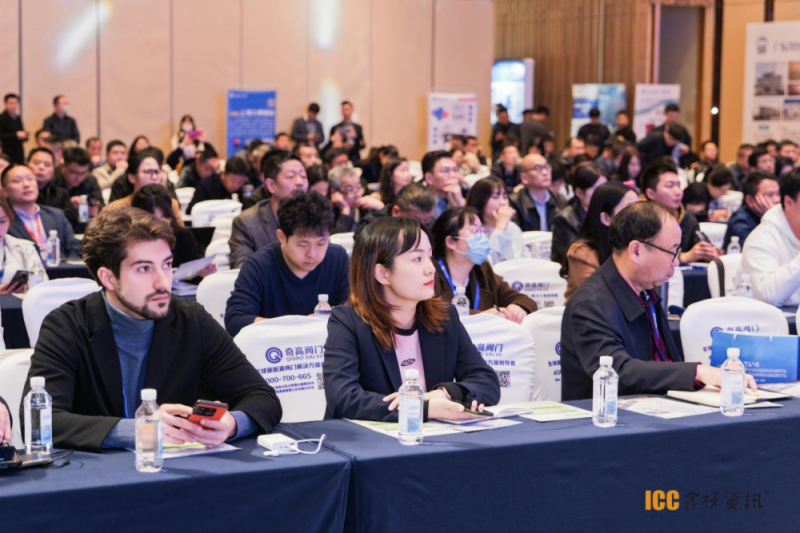
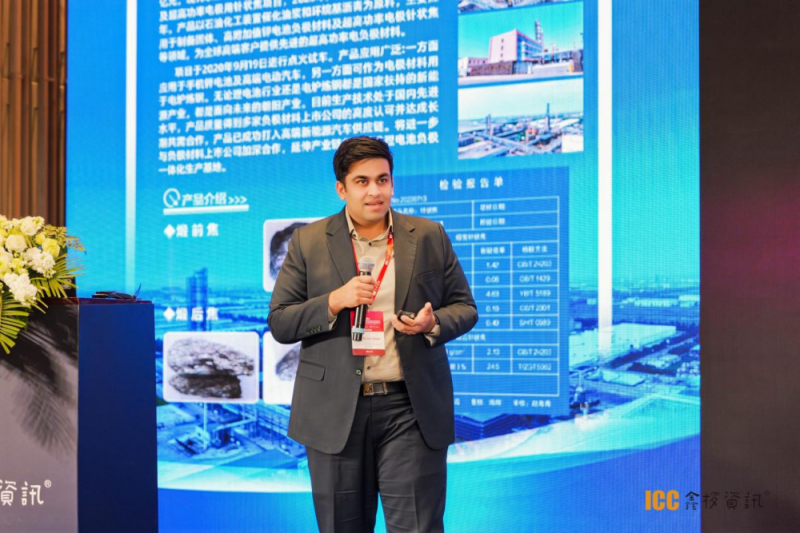
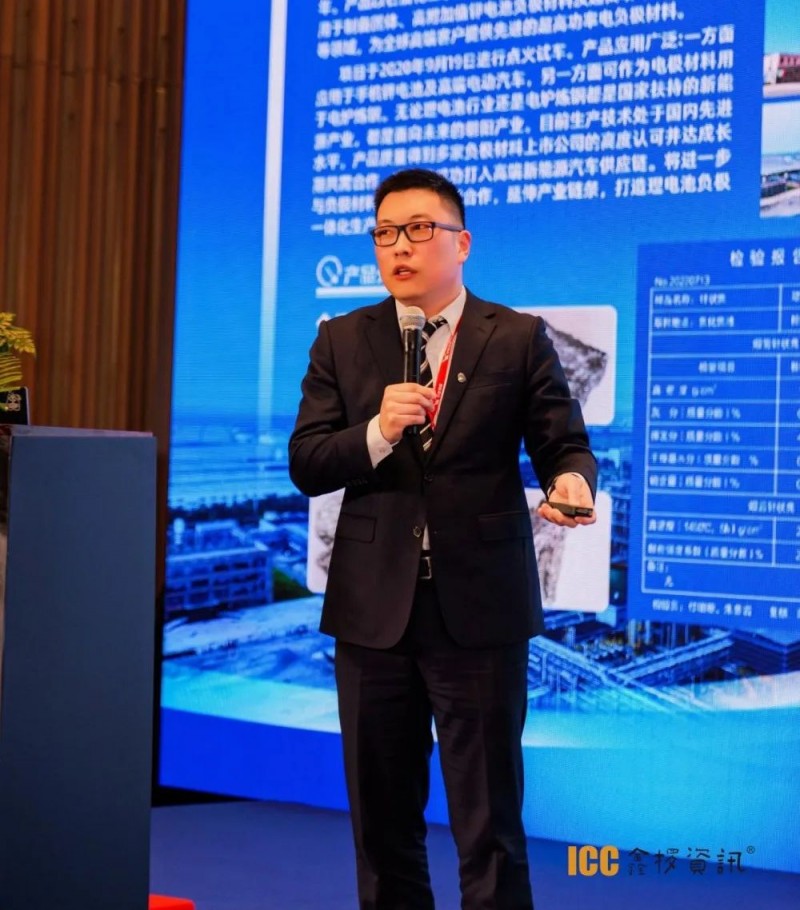
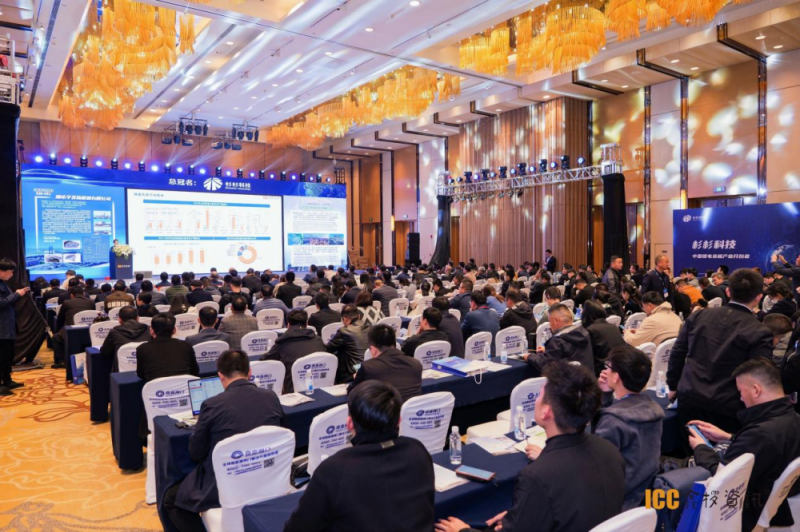
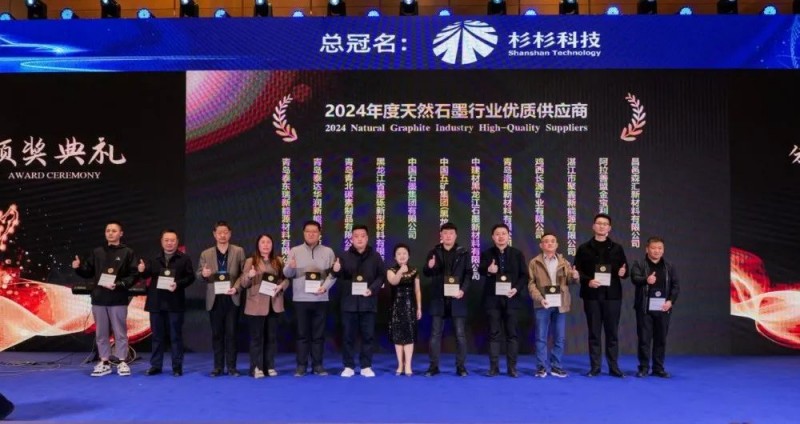
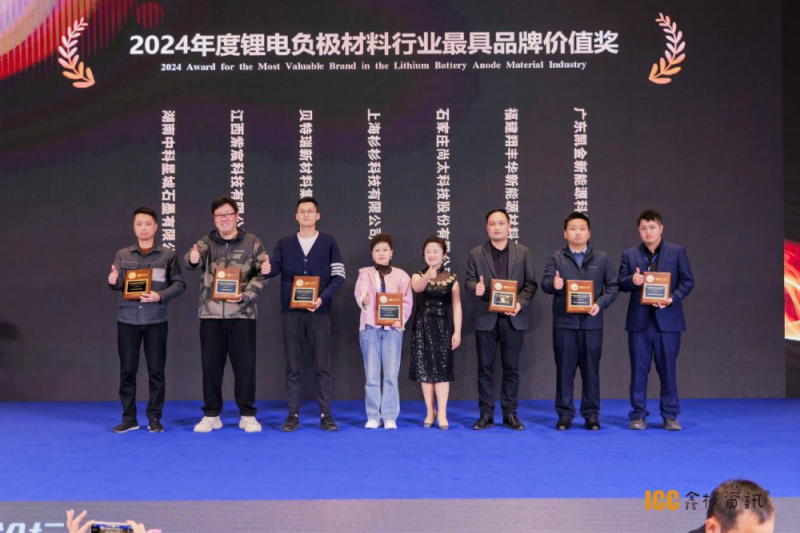
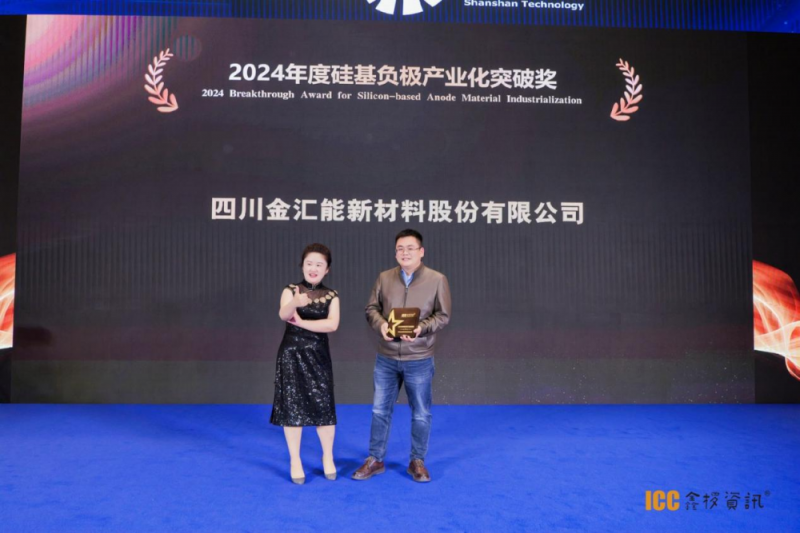
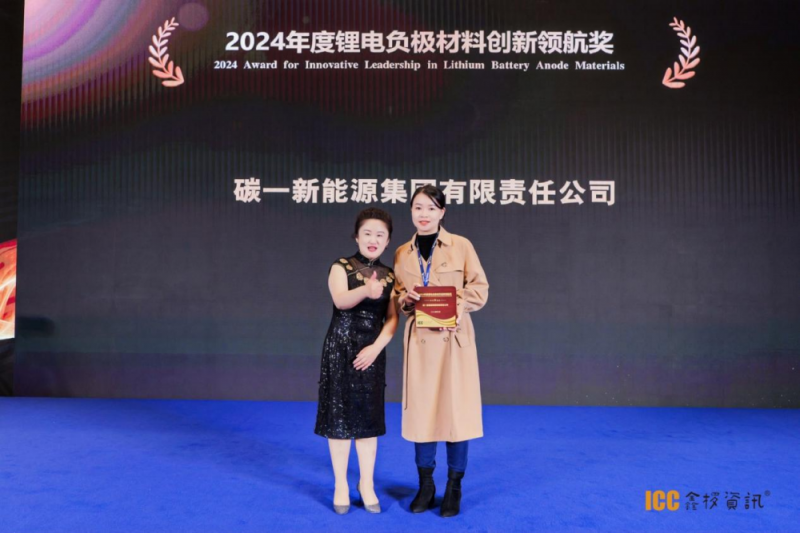
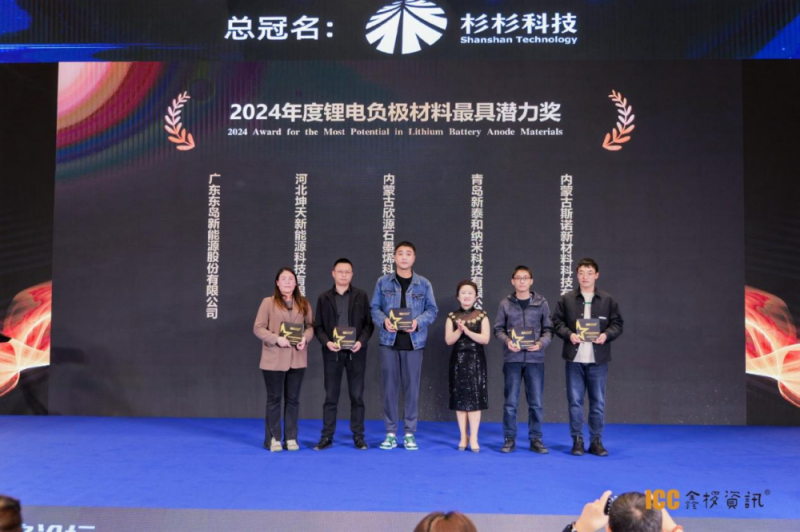
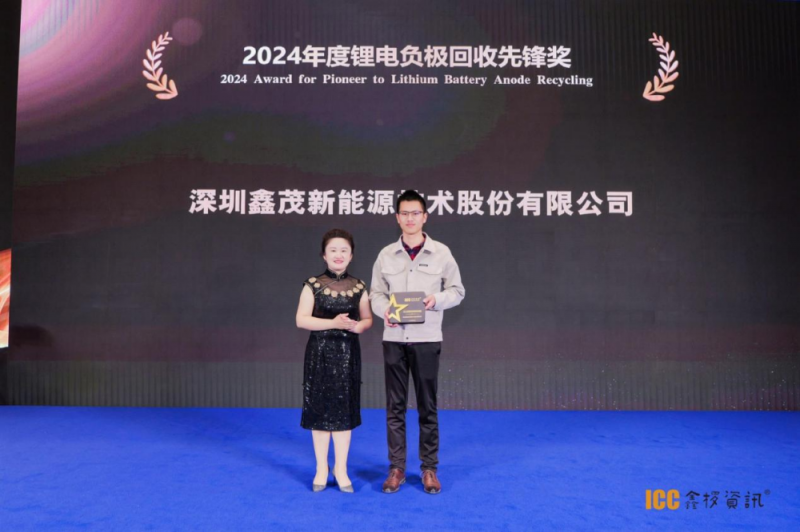
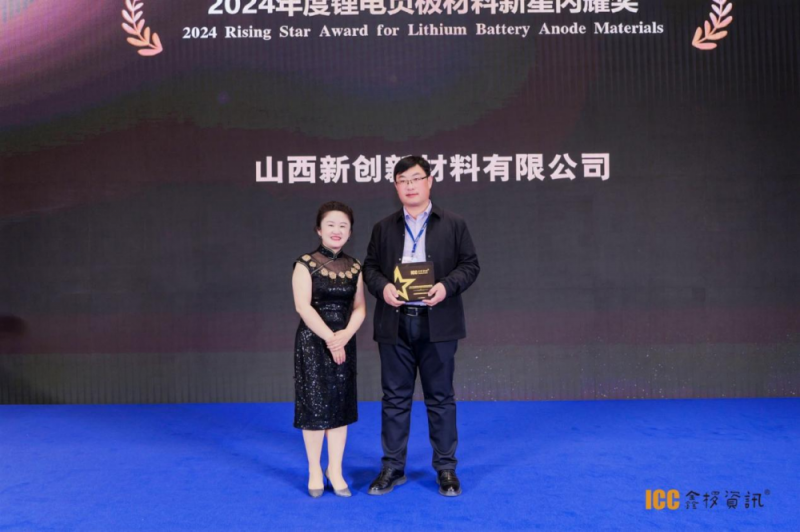
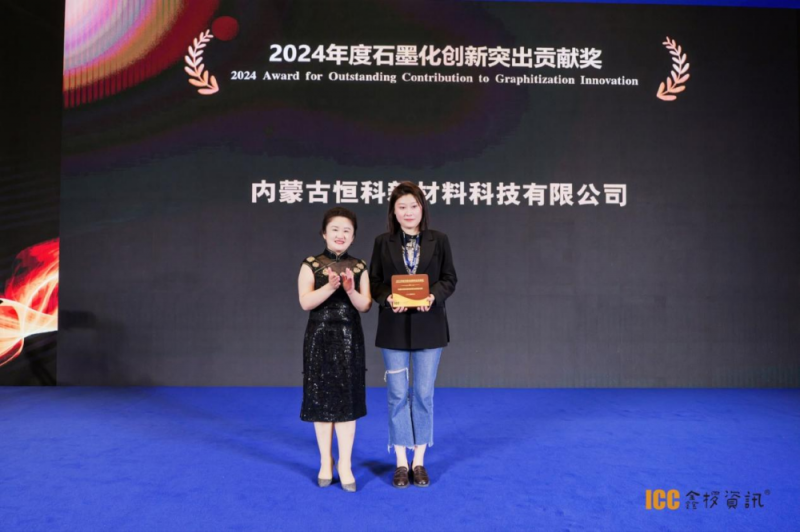
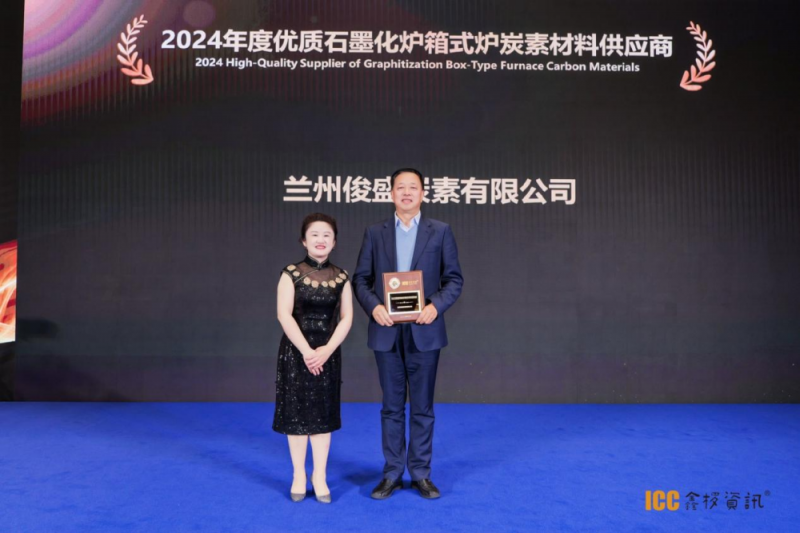
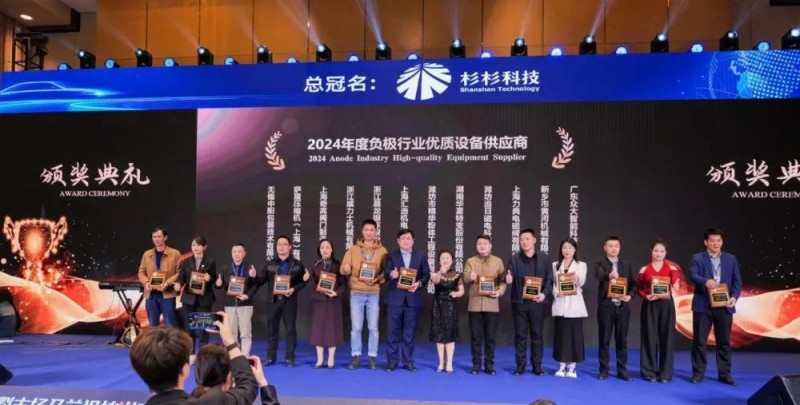
About us: ICCSINO was established in 2010. It mainly serves the three major industries of carbon, lithium battery, and electric furnace steel. It is China's leading professional industry research and consulting company. ICCSINO is research-centered and provides media information, research consulting, database and marketing solutions.
ICC Lithium Battery focuses on tracking lithium battery raw materials, lithium batteries and their downstream related industry chains, collecting and researching market prices, market trends and other information. It tracks more than 400 manufacturing companies in the industry all year round and has a complete industry database. Provide customized reports according to enterprise needs and provide professional services to enterprises.
ICC Lithium Battery is research-centered and serves industry enterprises, financial institutions (primary and secondary market private equity funds/brokerages/banks, etc.), universities/scientific research institutes, governments, etc., providing customers with unique insights, analysis and resources to help Customers make efficient decisions to achieve high-quality business growth.
ICC Lithium Battery focuses on tracking lithium battery raw materials, lithium batteries and their downstream related industry chains, collecting and researching market prices, market trends and other information. It tracks more than 400 manufacturing companies in the industry all year round and has a complete industry database. Provide customized reports according to enterprise needs and provide professional services to enterprises.
ICC Lithium Battery is research-centered and serves industry enterprises, financial institutions (primary and secondary market private equity funds/brokerages/banks, etc.), universities/scientific research institutes, governments, etc., providing customers with unique insights, analysis and resources to help Customers make efficient decisions to achieve high-quality business growth.




 CONTACT US
CONTACT US ICC APP
ICC APP
